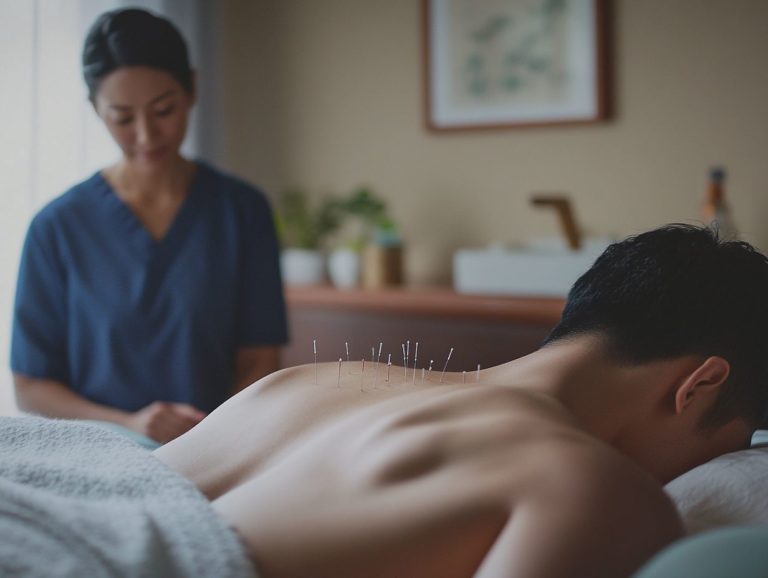How Acupuncture Helps with Hormonal Balance
Hormonal imbalances can trigger a host of uncomfortable symptoms and health issues. These imbalances influence everything from your mood to your metabolism.
Let s dive into the world of hormonal imbalances and discover what causes them. This article explores their complexities, highlighting Traditional Chinese Medicine (TCM) and how acupuncture can help restore hormonal balance.
You ll learn about complementary therapies, what to expect during an acupuncture session, and essential precautions to keep in mind.
Join us as we explore the potential of acupuncture to help you achieve hormonal harmony.
Contents
- Key Takeaways:
- Understanding Hormonal Imbalances
- Traditional Chinese Medicine and Acupuncture
- How Acupuncture Can Help with Hormonal Balance
- Other Ways Acupuncture Can Address Hormonal Imbalance
- What to Expect During an Acupuncture Session
- Precautions and Considerations
- Frequently Asked Questions
- 1. How does acupuncture help with hormonal balance?
- 2. Is acupuncture effective for all types of hormonal imbalances?
- 3. Can acupuncture help regulate menstrual cycles?
- 4. How many acupuncture sessions are needed to see results for hormonal balance?
- 5. Are there any side effects from acupuncture for hormonal balance?
- 6. Can acupuncture help with emotional symptoms related to hormonal imbalance?
Key Takeaways:

Acupuncture is a natural way to tackle hormonal imbalances. It reduces symptoms like mood swings and irregular periods by activating your body s healing mechanisms. Acupuncture can also be combined with other therapies and lifestyle changes to further support your health. Be sure to consult with a licensed acupuncturist for personalized treatment.
Understanding Hormonal Imbalances
Hormonal imbalances significantly impact various health conditions. They manifest through a range of symptoms that can disrupt your quality of life.
For women, this often involves shifts in estrogen and progesterone levels. These changes may lead to mood disorders, difficulties with fertility, menopause symptoms, and conditions like polycystic ovary syndrome (PCOS), which can cause irregular periods and weight gain.
Fluctuations in follicle-stimulating hormone (FSH) and luteinizing hormone (LH) levels also complicate hormonal health.
Understanding these dynamics is essential for effective management. It allows you to regain balance and improve your overall well-being.
Causes and Symptoms
The causes of hormonal imbalance can vary widely. They stem from lifestyle factors like stress and diet, as well as underlying health conditions affecting thyroid function and reproductive hormones.
Chronic stress may elevate cortisol levels, disrupting normal hormonal activity. This disruption can lead to significant weight fluctuations, insomnia, and emotional instability.
For many individuals, hormonal imbalances complicate or even result in infertility. Irregular cycles and disrupted ovulation often arise from these lifestyle choices.
By maintaining a balanced diet and effectively managing stress, you can play a pivotal role in restoring hormonal harmony and enhancing your reproductive health outcomes.
Traditional Chinese Medicine and Acupuncture
Traditional Chinese Medicine (TCM) is an ancient healing system that encompasses various modalities, including acupuncture, aimed at promoting energy alignment and enhancing health.
Practitioners like Dr. Hong Yan in Bend provide TCM solutions. They integrate acupuncture and Chinese herbs to restore your Qi balance and effectively address a range of health conditions.
TCM views the body as an interconnected system, where physical and emotional health are intricately linked. This offers you a holistic approach to well-being.
Overview of Acupuncture and Its Role in TCM
Acupuncture is a vital element of Traditional Chinese Medicine. It involves the careful insertion of fine needles into specific meridians to restore the balance of Qi and promote your overall well-being.
This ancient practice doesn t just alleviate physical ailments; it also plays a crucial role in emotional wellness by harmonizing the energy flow throughout your body.
By targeting specific points, acupuncture effectively addresses a wide range of health conditions. These include chronic pain, stress management, digestive issues, and hormonal imbalances.
Practitioners believe that when your energy, or Qi, is properly aligned, you may notice a boost in mood, leading to better sleep quality and greater resilience to life s challenges.
As a holistic approach, acupuncture becomes a valuable tool for enhancing your overall health and vitality.
Ready to restore your hormonal balance? Explore how acupuncture can help transform your health today!
How Acupuncture Can Help with Hormonal Balance

Acupuncture is quickly becoming a go-to method for restoring hormonal balance! It is great for issues like infertility and menopause.
Specific Benefits for Different Hormones
Acupuncture offers a host of benefits for hormonal health, including regulating estrogen and progesterone levels. This can help alleviate symptoms of menopause and mood disorders.
It also balances other essential hormones, such as follicle-stimulating hormone (FSH), which helps with egg production, and luteinizing hormone (LH), which is crucial for reproductive health.
By stimulating specific acupuncture points, this ancient practice enhances circulation and improves hormonal communication. This supports better reproductive function and fertility.
Regular acupuncture sessions can aid in weight loss by boosting metabolism and regulating appetite hormones. It makes it easier for you to maintain a healthier weight.
The calming effects of acupuncture elevate your emotional well-being, reducing anxiety and depression. This underscores its significance in a holistic health approach.
Other Ways Acupuncture Can Address Hormonal Imbalance
In addition to its direct benefits, acupuncture can serve as an integral part of a holistic strategy to tackle hormonal imbalances. It seamlessly integrates with complementary therapies and thoughtful lifestyle adjustments.
Complementary Therapies and Lifestyle Changes
Complementary therapies, such as using Chinese herbs and making lifestyle changes, can significantly enhance the effectiveness of acupuncture in addressing hormonal imbalances.
Integrating herbal treatments like Dong Quai or Red Clover can improve hormonal balance, along with boosting your overall wellness.
Stress management techniques, including mindfulness meditation and yoga, play a vital role in cultivating a serene mental state. This is essential for maintaining hormonal health.
Making lifestyle adjustments such as adopting a balanced diet rich in omega-3 fatty acids, engaging in regular physical activity, and ensuring you get enough sleep can empower your body’s hormonal systems.
Together, these approaches not only optimize the results from acupuncture but also foster a more harmonious connection between your mind and body, leading to enduring health benefits.
What to Expect During an Acupuncture Session
During an acupuncture session, you can anticipate a personalized approach meticulously tailored to your unique health history.
Practitioners like Dr. Hong Yan in Bend will expertly guide you through the entire process, ensuring a comprehensive and enriching experience.
Process and Duration

An acupuncture session typically begins with a thorough assessment. You ll discuss your unique health needs, symptoms, and goals with the practitioner. This evaluation is essential for tailoring the treatment to you.
Once the assessment wraps up, needles are strategically inserted along meridian pathways believed to correspond to various bodily functions. The length of your session may vary some treatments focus on acute issues and require less time, while others address chronic conditions and may take longer.
You might be pleasantly surprised to discover that many clients find the needle placement process surprisingly calming. This aspect not only enhances the therapeutic experience but also promotes relaxation, ultimately contributing to your overall health and well-being.
Precautions and Considerations
Acupuncture is mostly safe, but be sure to discuss your health history and any concerns with your practitioner.
Ready to restore your hormonal balance? Book an acupuncture session today!
Who Should Avoid Acupuncture
Certain individuals should avoid acupuncture. This is especially true if they have health conditions that jeopardize safety.
For instance, if you have a bleeding disorder like hemophilia, you’ll want to exercise caution due to the risk of bruising or bleeding at needle sites. If you’re on blood-thinning medication, the stakes are higher, and it’s essential to consult with your healthcare provider before starting any treatment.
If your immune system is weak or if you’re dealing with an infection, acupuncture might not be safe, as introducing needles could worsen your condition.
Pregnant individuals should also approach this practice with care, as certain acupuncture points might start labor. It’s crucial to talk to a healthcare professional before starting acupuncture. They can guide you to the safest options tailored just for you!
Frequently Asked Questions
1. How does acupuncture help with hormonal balance?
Acupuncture helps with hormonal balance by stimulating specific points on the body associated with the endocrine system. This stimulation supports overall wellbeing and helps regulate the production and release of hormones, improving hormonal imbalances. For more information, check out how acupuncture supports overall wellbeing.
2. Is acupuncture effective for all types of hormonal imbalances?

Yes, acupuncture can be effective for a variety of hormonal imbalances, including those related to thyroid function, menopause, and fertility. It can also help manage symptoms of conditions like PCOS and endometriosis.
3. Can acupuncture help regulate menstrual cycles?
Yes, acupuncture can help regulate menstrual cycles by promoting blood flow and balancing hormone levels. It may also relieve common symptoms like cramps, bloating, and mood swings.
4. How many acupuncture sessions are needed to see results for hormonal balance?
The number of sessions needed varies depending on the individual’s condition and goals. Some people may see improvement after just a few sessions, while others may require ongoing treatment for more chronic imbalances.
5. Are there any side effects from acupuncture for hormonal balance?
Acupuncture is generally a safe and non-invasive treatment with minimal side effects. However, some people may experience slight bruising or soreness at the site of the needles. It’s important to consult with a licensed acupuncturist to ensure safe and proper treatment.
Yes, acupuncture can help with emotional symptoms such as mood swings, anxiety, and irritability that may be caused by hormonal imbalances. By regulating hormone levels, acupuncture can improve overall emotional and mental well-being.
Ready to explore how acupuncture can benefit you? Consult with a specialist today!






